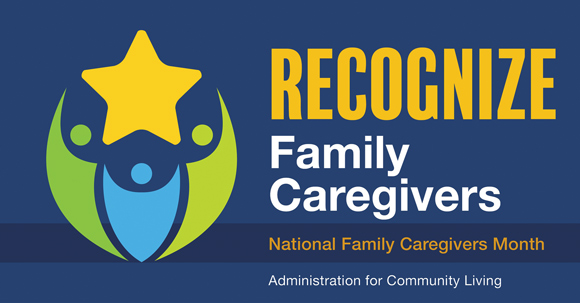
Family Caregivers—Assisting With Love
Alfredo G. Evangelista | Assistant Editor
4:30 a.m. ‘Īao Intermediate School teacher Edward “Ed” Garcia takes his morning walk with his trusted companion, Bella, a year-old lhasa apso. By 5 a.m., Bella and Garcia are back home and Garcia wakes his 91-year-old parents and gets them ready for the day.
It’s not easy.
Each day, Garcia prepares their clothes and meals for the day, assists his mother with dressing and toileting, and transfers his mother from her bed to her wheelchair, to the toilet and back to her wheelchair before heading out the door at 6:30 a.m. and driving her to the Maui Adult Day Care Center in Kīhei. His father Amancio stays home with Bella.
Some people aren’t even up at 6:30 a.m.
Increasingly, Garcia’s story is the norm for Maui residents who have taken on the role and responsibility of caring for an elderly parent. “They took care of us, now we take care of them,” says Garcia with an educator’s matter-of-factually assurance. “My parents taught me to always value our family. For me, I feel I need to keep giving back to them.”
Garcia notes creating routines and being in a familiar environment causes less stress, confusion and agitation. But challenges still happen.
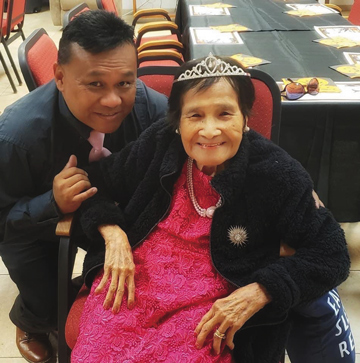
Photo courtesy Ed Garcia
“Good job, Mama!” cheers Garcia when his mother successfully makes her way into their van. Garcia’s mother is generally in a good mood this morning. But she experiences days when she’s not ready or asks pointed questions about Garcia and his role. “In the beginning, she would be calling me all kinds of names in the book but I learned not to take it personally. You need to laugh, then try to make your loved one laugh. Sometimes, the cussing and the hurtful words they say to you can get to you but you gotta step back and think how you can make the best of your situation.”
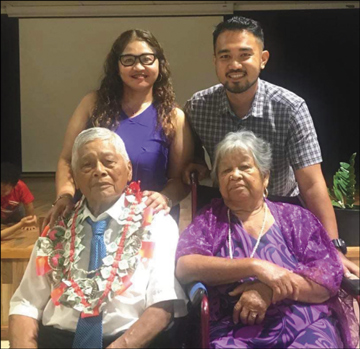
Photo courtesy Agcolicol ‘Ohana
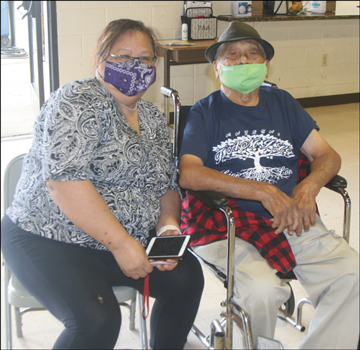
Photo: Alfredo Evangelista
“I never thought I would be taking care of my parents,” says Melen Agcolicol, businesswoman (owner of Copy Services), community leader (president of Binhi at Ani) and daughter of 98-year-old Stanley Magbual and 87-year-old Rufina Magbual. “Both of my parents now need 24/7 care. When I was young, they were both strict with me for everything including doing chores, school and especially boys,” she recalls. “Now it is the opposite as I am now strict on the food they eat or strict on not forgetting to take their medications although one of us always assists them. It’s not an easy task to take care of your parents.”
Agcolicol and Garcia are among the 157,000 Hawai‘i residents estimated by AARP who are caregivers. Nationally, more than fifty million Americans serve as caregivers.
The trend has long been recognized. Then-President William “Bill” Clinton signed the first proclamation of November as National Family Caregivers Month in 1997. Each subsequent president has followed suit.
This year, President Joseph B. Biden, Jr. issued a proclamation which stated in part: “During National Family Caregivers Month, we recognize the love and sacrifice of more than 50 million Americans providing crucial care and medical assistance to parents, children, siblings, and other loved ones, ensuring their health and dignity … The truth is, at some point in our lives, each of us will likely need to be a family caregiver—but the burden falls especially hard on those who cannot afford support … Family caregivers are the backbone of our Nation’s long-term care system, doing essential work with devotion, often at great emotional and financial cost. We owe them. It is time to bring their service out of the shadows and celebrate and support them in living their own happy, healthy, and fulfilling lives.”
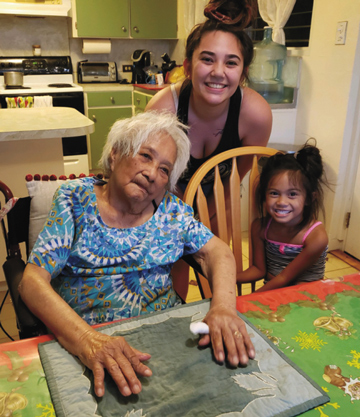
Photo courtesy Nora Cabanilla-Takushi
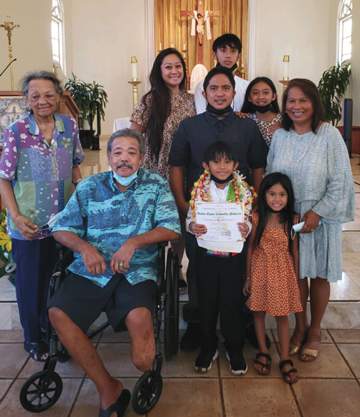
Photo courtesy Nora Cabanilla-Takushi
Nora Cabanilla-Takushi and her husband Craig provide care for Nora’s 95-year-old mother Pacita Ramos Cabanilla and Craig’s 85-year-old parent Mary Elizabeth Francis Takushi. Cabanilla, who has dementia, lives with her youngest daughter Lani Cabanilla in Lahaina. Takushi lives downstairs in her own residence in Pā‘ia while her son Kelly and his family live upstairs.
“We help Lani,” says Cabanilla-Takushi. “Mom stays with us on Fridays, Saturdays, Sundays and Mondays. We feed her, bathe her and change her diapers. When Lani goes on vacation, we take full care. When I can’t put in our days, my sister Essie helps. My brother Felix takes care of the yard and my other siblings help with the cooking.”
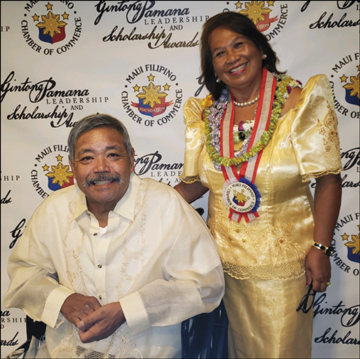
Photo courtesy Nora Cabanilla-Takushi
Cabanilla-Takushi—who is also active at her church, her diocese and Binhi at Ani, among other activities—also provides care for her mother-in-law. “We pick her up from Pā‘ia on Friday afternoons and she stays with us on Saturdays and Sundays. On Monday mornings, we drop her off at Maui Adult Day Care in Kahului. When I have to do all my activities, my husband is the caregiver along with my brother Florentino.”
Cabanilla-Takushi now also assists her husband Craig who recently lost his left leg below the knee. He explains they work as a team in caring for their moms. “We share the load together.” Even with his own disability, he’s able to assist. “I thank God I can get around pretty good, even in a wheelchair. She doesn’t need to give me a bath or change me,” he says. Cabanilla-Takushi feels blessed. “I count my blessings because Craig can still clean the house. I wash the clothes and he folds them and puts them away. He doesn’t get to do the yardwork anymore; I do it. But I have the grandkids and the help of my brother.”
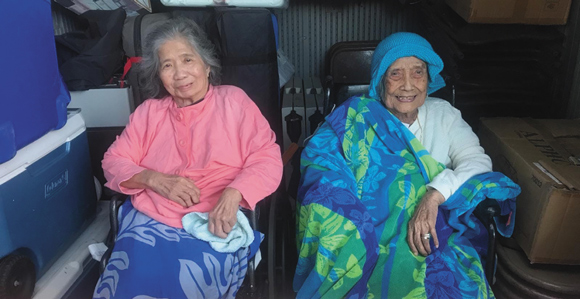
Photo: Basilia Evangelista
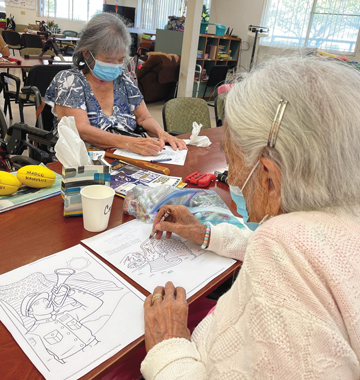
Photo courtesy Alfredo Evangelista
On a personal note, my wife Basilia and I have similar experiences with the Garcia, Magbual and Cabanilla families and countless others on Maui and throughout the State. My 98-year-old Mom Catalina Gonzales Evangelista now lives with us in Waikapū and my wife Basilia is the main caregiver. My wife is also a caregiver for her 82-year-old Mom Jacinta Tumacder Idica who has dementia and lives at her home in Kahului with her main caregiver, Basilia’s sister Gemma.
Mom started living with us full-time after my sister Gloria, her lead caregiver, died. While my sister Gloria battled cancer, my Mom lived with my sister Estrelita. I provided a weekend respite to my sister Estrelita. Estrelita now comes each morning to prepare my Mom’s breakfast while my wife and I get ready for work. My Mom then spends her day at Maui Adult Daycare in Kahului and we need to be home by 5 p.m. when she gets dropped off by the private transportation system.
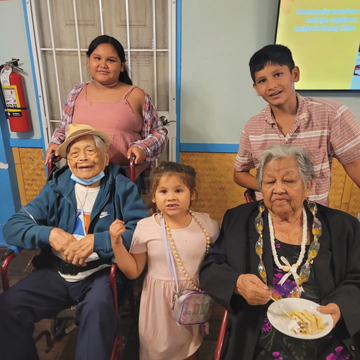
Photo courtesy Melen Agcolicol
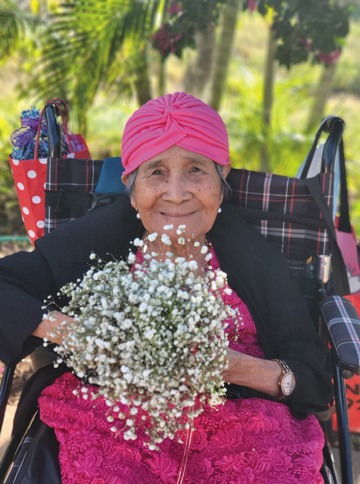
Photo: Ed Garcia
A private caregiver comes in at 10 p.m. to be with my Mom while we sleep. It’s been a huge burden on my wife because many times I have to work late or have meetings for Binhi at Ani. I’m just thankful for all those who provide support to me and my wife. It’s really been stressful for me and my wife and we often find ourselves sharing stories with other caregivers.
Governor David Y. Ige also issued a Proclamation recognizing National Family Caregivers Month in Hawai‘i, noting “Hawai‘i’s population is rapidly aging and the majority of our kūpuna age 65 and over wish to remain in their homes and communities as they age … One in five adults in Hawai‘i serve as family caregivers, providing a broad range of assistance to loved ones dealing with challenges such as age, illness, injury, and chronic or disabling conditions … It is imperative to ensure that caregivers have the necessary support and services; be able to continue to earn a living; find a balance between caregiving, their families and relationships, and career; and have time for themselves.” Ige asked Hawai‘i’s people to “join me in recognizing the critical role family caregivers play in a loved one’s life and help make it possible for our kūpuna to age in place.”
Aging in place or not living in a care facility is often requested by elderly parents, requiring their children or younger relatives to rearrange their lives. “For us, the only option to take care of our parents is the family,” says Agcolicol. “The care home or nursing home is not an option. They already told us that going to a nursing home or facility will kill them early. As they wish, we do our best to take care of our parents the same way when they took care of us when we were kids—only harder because it takes a lot of patience, love and energy.”
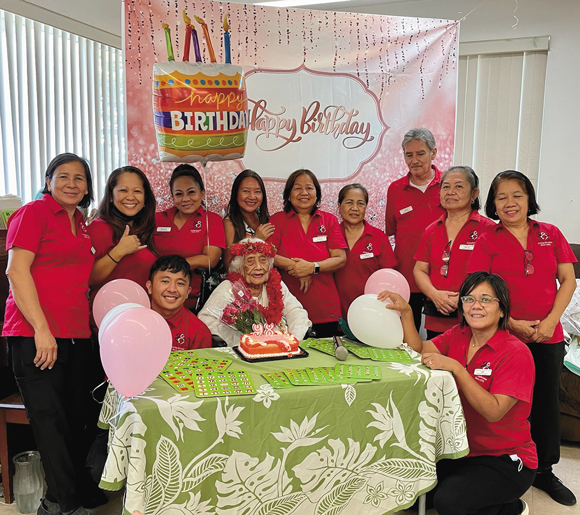
Photo courtesy Alfredo G. Evangelista
Caregivers receive some relief from locally-based services.
For example, Cabanilla-Takushi’s mom and mother-in-law both go to Maui Adult Day Care. Her Mom goes to the facility in Lahaina while her mother-in-law goes to the facility in Kahului. “They’re awesome. They take good care of them,” says Cabanilla-Takushi. Maui Economic Opportunity provides transportation back and forth. “We gotta be home and we gotta get her ready.”
“Mom enjoys going to the Maui Adult Day Care Center because she gets to socialize with others and engage in different activities,” says Garcia. “They also have a caring staff. She has a daily routine in day care and that helps keep her assured and less anxious.”
Maui Adult Day Care has four facilities (Lahaina, Kīhei, Wailuku and Kahului) and a senior center in Hāna. Their hours are 6:30 a.m. to 6 p.m., Mondays to Fridays. On Saturdays, the Kahului and Lahaina facilities are open from 7:30 a.m. to 4:30 p.m. The Kahului facility is also open on Sundays from 8:30 a.m. to 4:30 p.m.
“Maui Adult Day Care Centers provides a social therapeutic program to help an older adult live and enjoy life at whatever level one is functioning,” explains Margie Dela Cruz, Executive Director of Maui Adult Day Care Centers. “An adult may still maintain independent skills in the home but could be isolated due to losing the ability to drive or get out or they could be struggling with physical or cognitive challenges. We bring friendship, activity and enjoyment back into the life of an older adult so one is living life and not just existing. We also provide assistance with personal care as needed with bathing, incontinence, toileting, feeding etc. Our clients range from being independent with ADL’s to needing full assistance to keep them safe and comfortable.”
In addition to client services, Dela Cruz also says the Centers provide caregiver support via monthly support groups, quarterly workshops and one-on-one caregiver counseling support in person or by phone. “There is no cost to a caregiver and you do not have to have a loved one attending our centers to benefit from caregiver support,” Dela Cruz says. “Call (808) 871-5804 for information regarding Maui Adult Day Care Centers and caregiver support. We are here to help the community of Maui care for our kūpuna and be part of the long-term continuum of service to the elderly since 1974.”
According to Dela Cruz, the cost is reasonable, ranging from $62 per day to $72 per day, depending on the level of care. Bathing service is also available at a cost of $20. The Kahului facility also offers a Sundowning program at a cost of $30 from 4 p.m. to 9 p.m., allowing caregivers a date night or respite. A variety of scholarships are available, including from the Hawai‘i Community Foundation, Maui United Way and the Maui County Office on Aging.
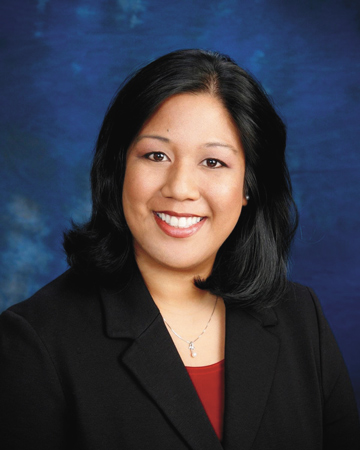
Rowena Dagdag-Andaya is the new Maui County Executive on Aging. While she transitioned into her new position from her prior position as Director of the Department of Public Works, she became the caregiver for her Mom Judita, a former care home operator. Dagdag-Andaya’s father died in November 2021 and Dagdag-Andaya’s Mom recently passed in September. Having been one herself, Dagdag-Andaya remains very empathetic to the plight of caregivers.
The Maui County Office on Aging’s mission is “To promote and protect the well-being of the older person in Maui County.” Its vision is that “individuals 60 years and older, their caregivers and persons with disability are independent, healthy and feel regarded as contributing members of the community.”
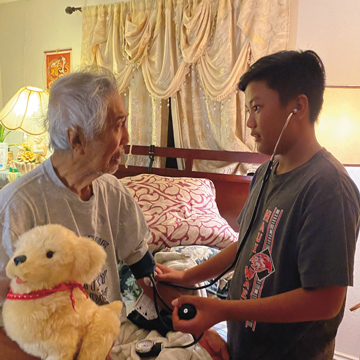
Photo: Rowena Dagdag-Andaya
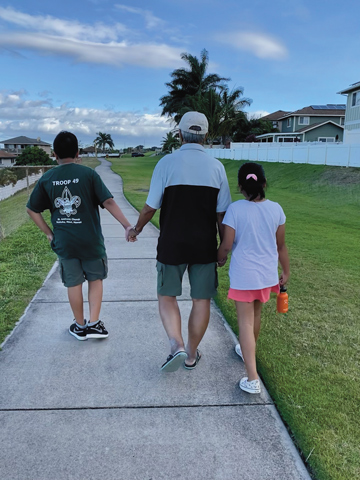
Photo Dagdag-Andaya
With the growing aging population in Maui County, the Office on Aging aims to address the needs of older adults and caregivers through its Kūpuna Care home and community-based services. The Maui County Office on Aging provides and authorizes services to the Islands of Maui, Molokai and Lāna‘i with an emphasis on Aging in Place. Every service, program and product referred or implemented by the Maui County Office on Aging and its contracted providers serve to assist Maui County’s seniors and adults with disabilities to lead independent, fulfilled, and dignified lives in their own homes and communities for as long as possible.
The Maui County Office on Aging along with their counterparts in all four counties in Hawai‘i, contracts with organizations serving the elderly to provide the following types of services: Information and Assistance, Adult Day Care, Chore Services, Congregate Meals, Home Delivered Meals, Homemaker services, Legal Assistance, Personal Care Services, and Assisted Transportation. Services are also available to caregivers. Such services include Adult Day Care Respite, Counseling, In-Home Respite, Training and Support Groups.
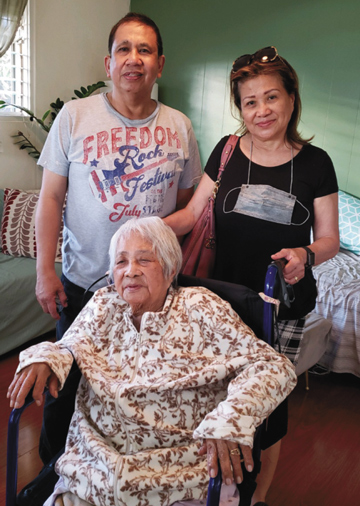
Photo: Nora Cabanilla-Takushi
In 2019, the Office created a Four-Year Area Plan on Aging for the time period October 1, 2019 through September 30, 2023. It produced five goals:
- Maximize opportunities for seniors to age well, remain active, and enjoy quality lives while engaging in their communities;
- Forge strategic partnerships and alliances that will give impetus to meeting Hawai‘i’s greatest challenges for the aging population;
- Strengthen the statewide ADRC (Aging and Disability Resource Center) system for kūpuna and their ‘ohana to access and receive long-term support services (LTSS) information and resources within their respective Counties;
- Enable people with disabilities and older adults to live in the community through the availability of and access to high-quality long-term services and supports, including supports for families and caregivers; and
- Optimize the health, safety, and independence of Hawai‘i’s older adults.
The Four-Year Plan is necessary as it addresses the issues described in the Older Americans Act of 1965 and identifies funding priorities for programs and services most needed by older adults, adults with disabilities and their caregivers. Statistics provided in the 2019 plan indicate that by 2030, twenty percent of the population will be elderly. The statistics estimate by 2030, Maui will have 45,091 persons that are 65 years or older. And although Maui County and Hawai‘i County had the largest proportion of Caucasians, Maui was still very ethnically diverse, with twenty-five languages spoken in the County of Maui. Of the languages other than English, Ilokano (8,665 speakers or 28.6 percent) and Tagalog (6,119 speakers or 20.2 percent) ranked #1 and #2, respectively in the top ten list of languages other than English spoken at home.
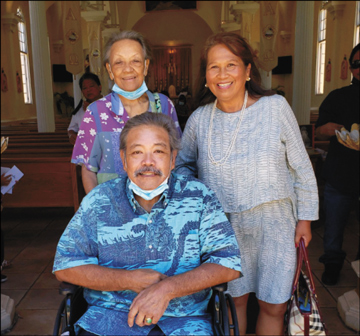
Photo courtesy Nora Cabanilla-Takushi
“A new Four-Year Area Plan on Aging is currently being prepared for the County of Maui as required by the Older Americans Act. This plan will cover the federal funding period of October 1, 2023, to September 30, 2027,” says Dagdag-Andaya. “It is important we obtain feedback from residents in all areas of Maui County so we can understand, plan and deliver effective and equitable services to our aging population and to caregivers.”
Like Dagdag-Andaya, Keali‘i Lopez, the State Director of AARP, is also a caregiver. “As a family caregiver for my mom, I know how difficult it is to balance work, caregiving and life in general. It makes a big difference to be able to talk to other caregivers about the challenges we face and to know that you are not alone,” said Lopez in announcing AARP’s activities to celebrate and support family caregivers during the National Family Caregivers Month.
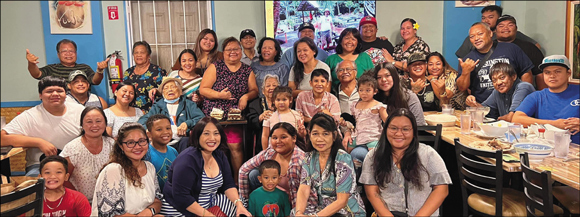
Photo courtesy Melen Agcolicol
AARP is the nation’s largest nonprofit, nonpartisan organization dedicated to empowering Americans 50 years and older to choose how they live as they age. AARP claims a membership of almost thirty-eight million members, including approximately 145,000 in Hawai‘i.
In a recent news release, AARP explained being a family caregiver is one of the toughest and most rewarding things that anyone can do for a parent or loved one. There’s generally no pay; the hours are long and the work is demanding.
“I think the most difficult part is giving my Mom a bath and changing her,” says Cabanilla-Takushi. “She’s bedridden, in a wheelchair, unable to move and has dementia.”
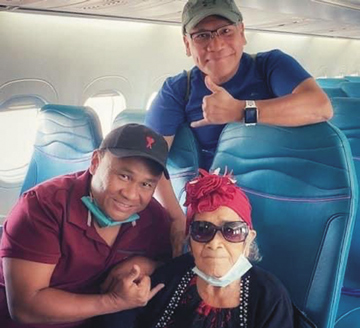
Photo courtesy Ed Garcia
Cabanilla-Takushi’s mother-in-law is more mobile. Although she too has dementia, she can bathe herself and feed herself but she can’t cook. “She still slaps me once in a while. And says ‘No talk to me like that,’ ” says Cabanilla-Takushi’s husband Craig.
It takes a whole team to take care of elderly parents and there’s always an unexpected situation. “Thanks to the CNA that comes to assist us or take care of our parents while we are at work,” says Agcolicol. “It can be frustrating when the CNA calls in sick because finding a cover on short notice is not an easy thing to do as there is a shortage of CNAs. The agency working with my parents can’t even fulfill thirty-six hours a week. For that missing CNA, the family has to fill in the empty hours. Although there’s twelve of us kids, we can’t rely on everybody for doing their share.”
“Get a lot of support,” Garcia offers. “When something happens, you need backup. Don’t take things personally. Don’t blame yourself for what’s going on. Find someone to talk to and connect with others who know what you’re talking about.”
By caring for her mother-in-law, Cabanilla-Takushi says “I get to hang out with her and find out things that she doesn’t like that I never knew before. But she’s willing to try stuff except she doesn’t like Filipino food.” Cabanilla-Takushi’s husband Craig explains “You gotta remember my Mom’s a mainland girl. She’s a meat and potatoes kind of person. We’ve started her on pancit, pork and peas and chicken adobo. But no chocolate meat yet—or sinigang soup. Even local food she doesn’t eat but she loves sashimi!”
Despite the challenges of being a caregiver, Cabanilla-Takushi enjoys being with her Mom. “Being around her is a blessing,” she explains. “I love to talk story with her and share stories from the past. And she always says ‘I love you.’ ”
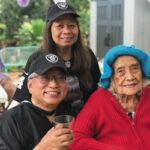 Alfredo G. Evangelista is the youngest child of Elias Acang Evangelista (who passed in 2000) and Catalina Gonzales Evangelista, who celebrated her 98th birthday in August. His granddaughter Cora Michele Dunlea Evangelista (daughter of Christian and Carolyn Evangelista) was born on November 16, 2022.
Alfredo G. Evangelista is the youngest child of Elias Acang Evangelista (who passed in 2000) and Catalina Gonzales Evangelista, who celebrated her 98th birthday in August. His granddaughter Cora Michele Dunlea Evangelista (daughter of Christian and Carolyn Evangelista) was born on November 16, 2022.
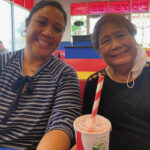 Rowena Dagdag-Andaya contributed to this story. She is the current Executive on Aging for the County of Maui and was previously the Director of the Department of Public Works. Her husband Herman Andaya is the Director of the Maui Emergency Management Agency.
Rowena Dagdag-Andaya contributed to this story. She is the current Executive on Aging for the County of Maui and was previously the Director of the Department of Public Works. Her husband Herman Andaya is the Director of the Maui Emergency Management Agency.
